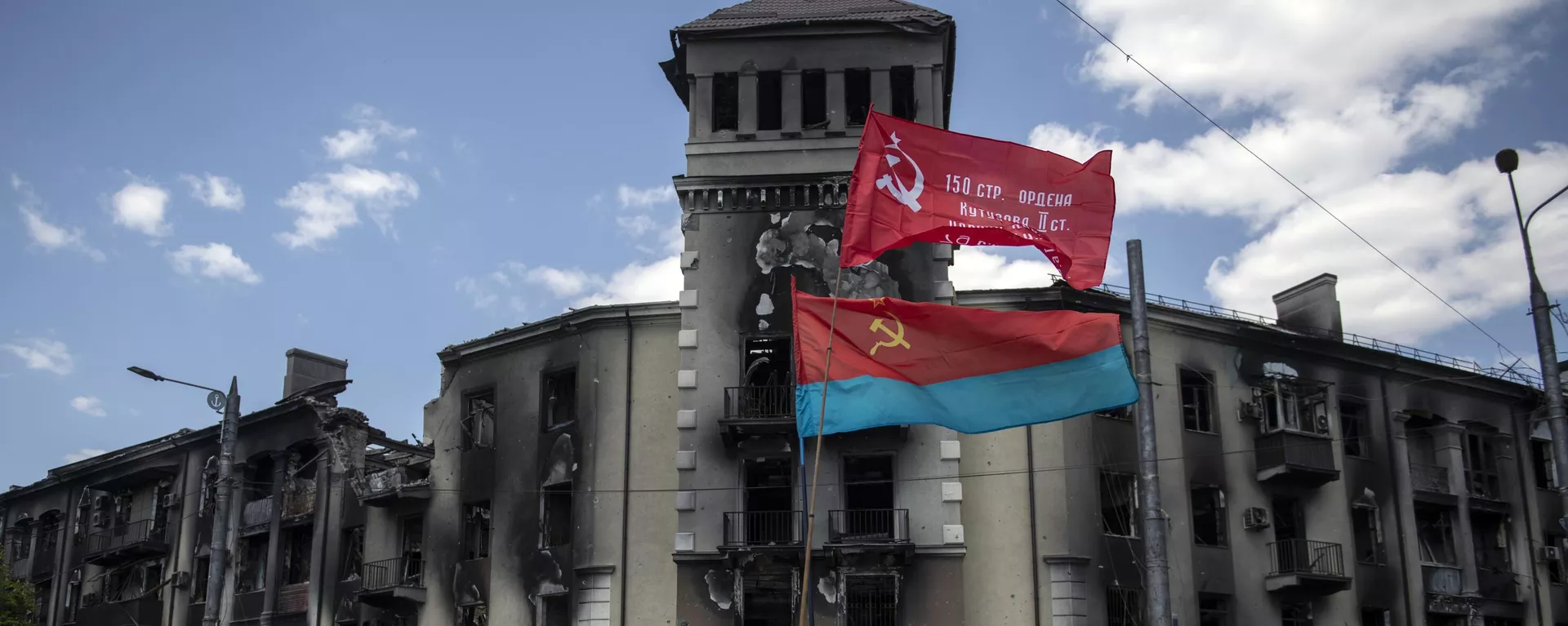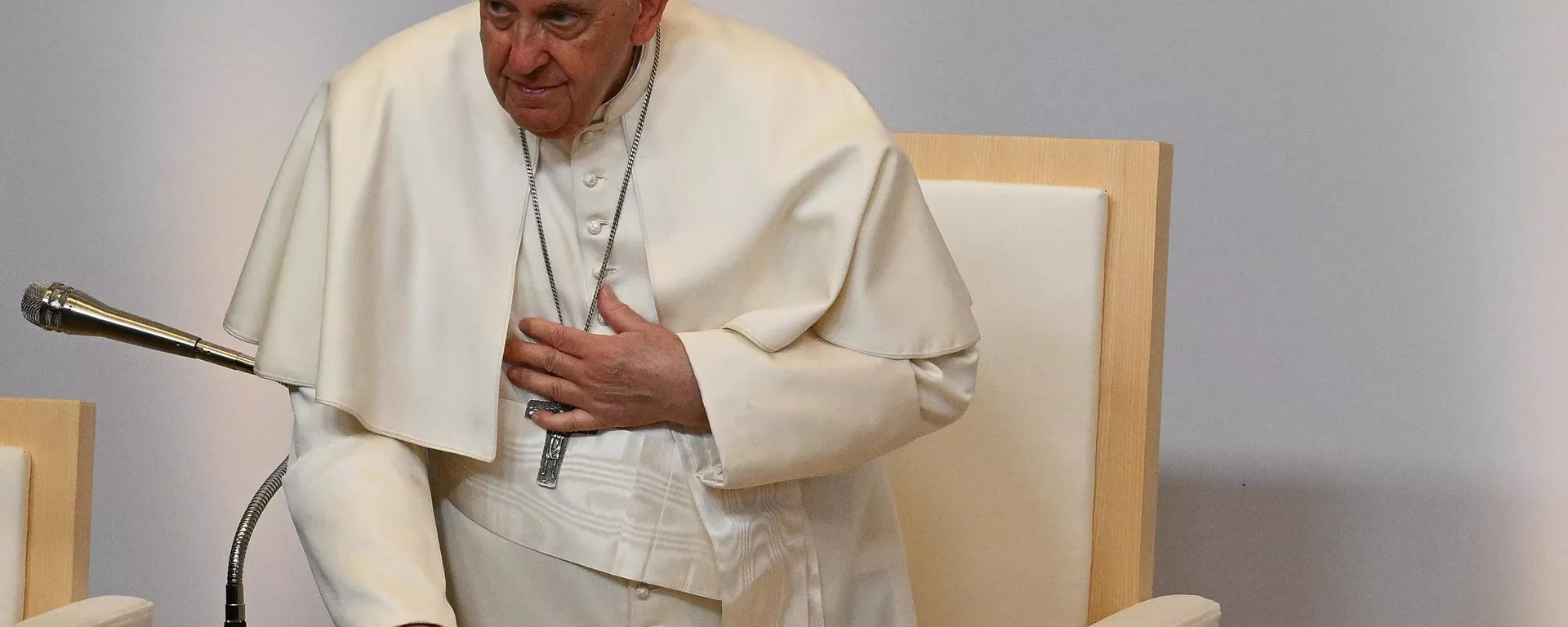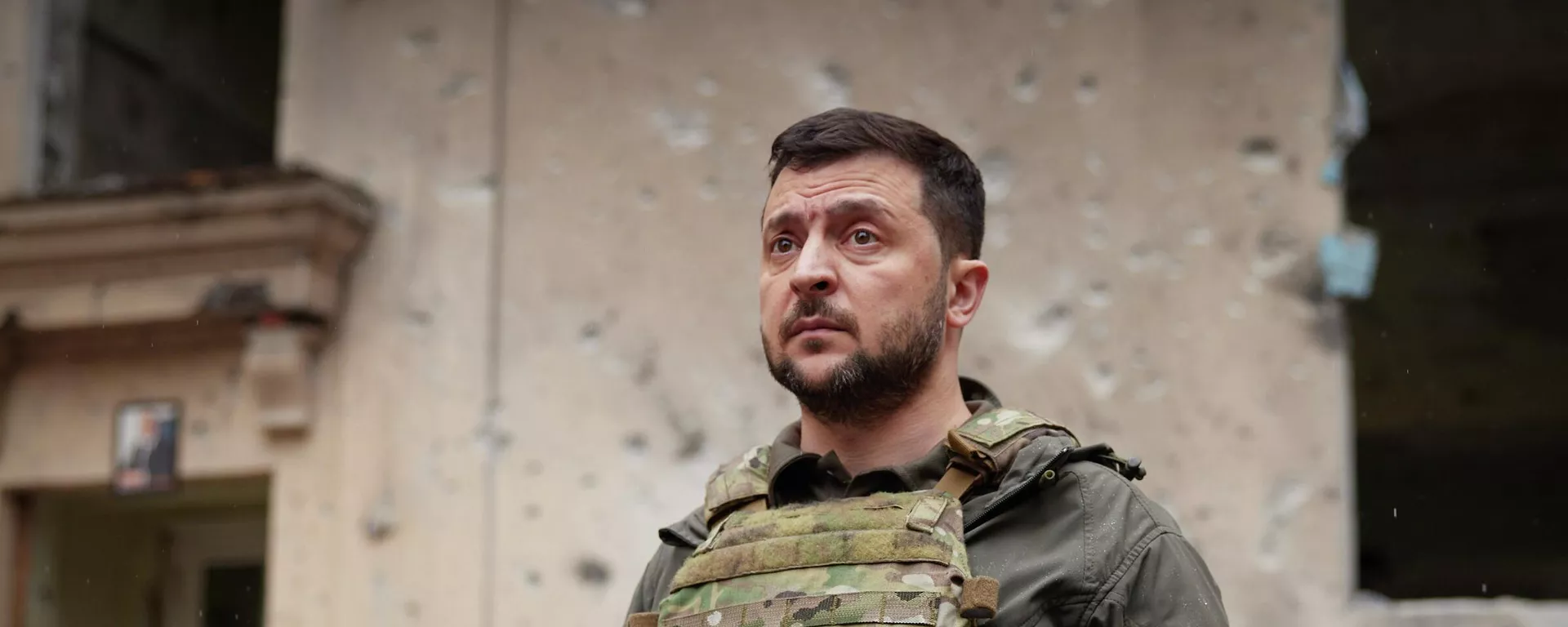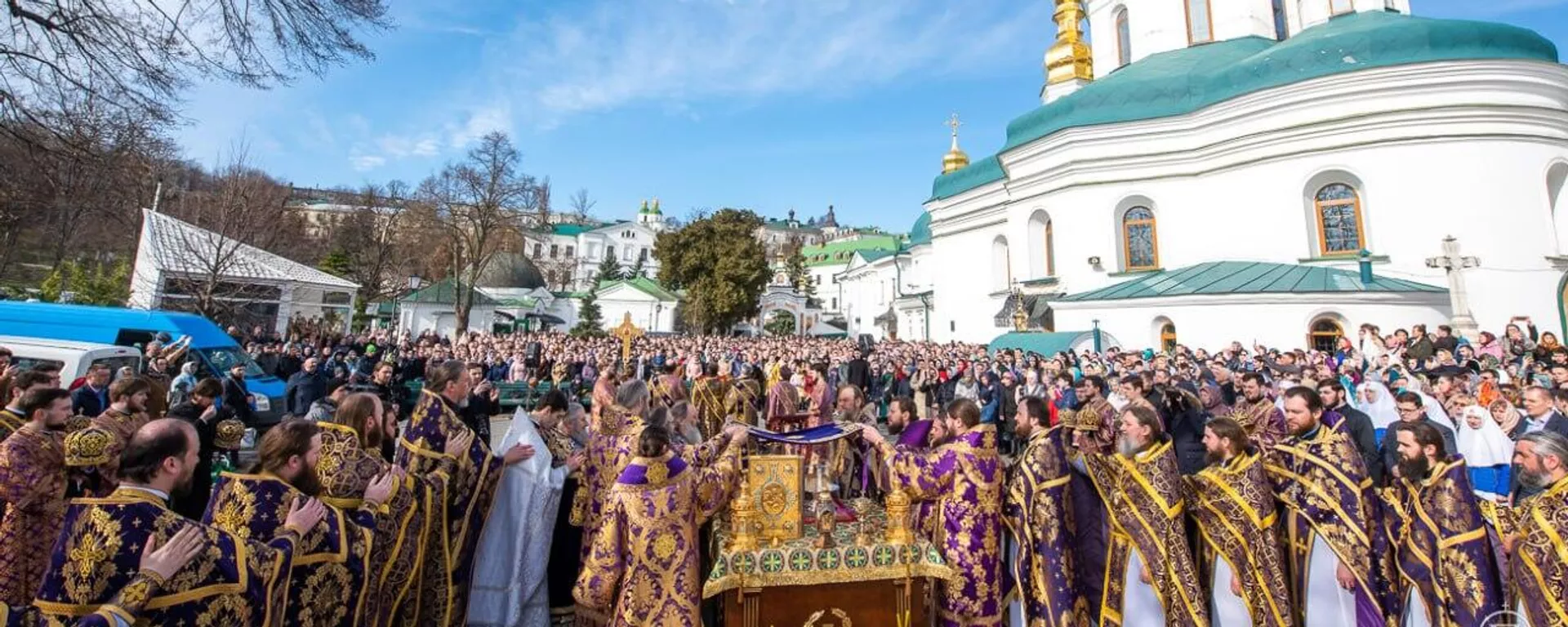Bloody Jester: Volodymyr Zelensky's Rise to Power
2 hours ago
© AP Photo / Ukrainian Presidential Press Office
Ekaterina Blinova
Exactly four years ago Ukrainian actor and comedian Volodymyr Zelensky was sworn in as the nation's sixth president. People who personally knew Zelensky tell Sputnik about his eerie transformation from a popular comedian into an unscrupulous manipulator and deranged politician, drunk on blood and dirty cash.
Initially lauded as a new Winston Churchill, Ukrainian President Volodymyr Zelensky is gradually
losing his veneer of a "defender of Ukraine".
Western mainstream press now writes about his "aggressive instincts" contrasting with his public-facing image as "the stoic statesman". It also criticizes Ukraine's terror attacks on
civilian infrastructure and Russian citizens under his government.
Who is Volodymyr Zelensky and how did he come to power?
Landslide Victory
Zelensky's ascendance to power was nothing short of spectacular: having zero experience in politics, the 41-year-old outperformed his rival, then-President Petro Poroshenko, by a staggering 49% margin. On May 20, 2019, Zelensky was inaugurated as the sixth president of Ukraine.
"I would call it a syndrome of the driven-to-despair electorate, sorry for this formal expression," Mikhail Grushevsky, a stage artist and showman told Sputnik. The landslide "was caused by utter despair and a feeling of hopelessness. Ukrainians had already experienced charm and disappointment by that time. Remember the euphoria of the so-called Orange Revolution of 2004? And Yushchenko's chants? What kind of heroine was Tymoshenko there? They invented and erected idols for themselves and then quickly overthrew them. In the same way, Poroshenko probably became a hero of 2014 for them. Once again they fooled themselves. And it seems to me that they were ready to believe any swindler."
Ukraine suffered from endemic corruption, internal political strife, and arbitrariness of ultra-nationalists who terrorized civilians in eastern and central Ukraine. Kiev's Russophobic agenda, disruption of economic ties with Russia, and unwillingness to comply with the Minsk agreements and end hostilities in Donbass exhausted the nation.
 World
'They Fired at Civilians': Mariupol Residents Recall 2014 Victory Day Massacre
World
'They Fired at Civilians': Mariupol Residents Recall 2014 Victory Day Massacre
9 May, 11:00 GMT
"[Zelensky] came as the president of peace, as a man who promised peace to Donbass and all of Ukraine," Grushevsky said. "And I remember we all listened to his first speech in the Rada [the Ukrainian Parliament – Sputnik], when he switched from Ukrainian to Russian and said that [the people in the east of Ukraine] were 'our people: They are as dear to us as other Ukrainians.' But it was just a pose. And I think that they voted for the person who promised them just that."
People were tired, first of all, of the established politicians, who were crooked as a dog's hind leg, who were stealing, who were liars, according to Yuri Kot, dean of the Faculty of Media Communications and Audiovisual Arts of the Moscow State Institute of Cinematography and author of the book "Ukrainians! We are Russians!"
"Ukrainians wanted someone new," Kot told Sputnik. "Well, they were given a jester. And that jester was not an ordinary one. He turned out to be a Little Zaches*, who used the trust of people for one single purpose: to get to power, get maximum fame and a huge amount of money, nothing more."
Yuri Kot
Author of the book "Ukrainians! We are Russians!"
Ukrainian President Volodymyr Zelensky holds a press conference on the first anniversary of his presidency, May 20, 2020.
© Sputnik / Стрингер
/
Go to the mediabank
A Master of Disguise
Zelensky came to prominence as a showman, actor and a comedian, who owes much of his success to Russia and the economic gains of being popular in such a big country.
In 1998, "Kvartal 95", a comedy team from Krivoy Rog State University led by Zelensky, made a successful debut in KVN ("The Club of Jolly Quick-Wits"), a Russian TV program in which teams of university students from post-Soviet spaces compete in a battle of wits. Zelensky's team played in KVN's highest league until 2003. In subsequent years, he made various shows and series for Ukrainian and Russian audiences, worked as an actor, screenwriter and producer - and was quite popular.
"We crossed paths in different situations, starting from the joint organization of celebrations," recalled Kot. "Plus we were friends. Of course, we had mutual friends; we rested together from time to time. (…) [Zelensky] was a man with a hidden agenda, anyway. When he says something it doesn't mean he thinks so. I remember one episode when I was the host of a show and then we had an unofficial poll on 'the most popular shows in Ukraine', and the audience named exactly the show which I hosted. And I remember that at that moment I caught his glance from the corner of my eye: it was a sharp, cold gaze. This man is clearly very envious, one can probably say so. Still, he had nothing to be envious about, he always had a popular show, but this is who he is, hungry for success, obsessed with it."
"It is no coincidence that people say 'beware of a silent dog and still water'," said Volodymyr Oleynyk, a Ukrainian politician and former PM of the Verkhovna Rada, who recalled his first impression of Zelensky being a nice non-aggressive guy.
"Zelensky is a master of disguise. Now he has got into this satanic character so deeply and believed that the whole world is listening to him. His boorish behavior with the Pope and others is a sign of a [stardom] disease of the actor."
 Russia's Special Operation in Ukraine
Ukraine's Zelensky Rejects Pope's Offer of Mediation
Russia's Special Operation in Ukraine
Ukraine's Zelensky Rejects Pope's Offer of Mediation
13 May, 21:59 GMT
Did Zelensky dream of a political career at that time? Unlikely, argued Oleynyk. Had Zelensky really planned to go into politics he would have never made silly and insulting jokes about Ukraine or engaged in murky financial schemes which later became his curse, he said.
Moreover, Zelensky appeared to be completely unprepared for debates with then-President Petro Poroshenko: Zelensky did not even know the Constitution of the country he sought to take the reins of, as per the ex-Cherkassy mayor.
"He entered politics from the back door," the ex-mayor told Sputnik. "And when some people draw parallels saying 'look, [Ronald] Reagan was an actor too', these comparisons are inappropriate because Reagan was a great actor for the American people. And he was also a governor. He was a congressman, people saw him. This is a rather difficult path when one is seen walking the talk. And [Zelensky] was seen only on the stage, where he joked, where he mocked Ukraine, called it a European whore, and so on, where he made such jokes about state symbols that many would not forgive him for. And then he made it straight to the presidency. He was neither an MP nor a mayor, so that people could judge him by his deeds. What could he do, except for jokes?"
Even now he is not the president of Ukraine in earnest, but is just playing the role, noted Oleynik. However, while previously people laughed at his jokes until they cried, now they are crying bloody tears, added the Ukrainian politician.
Ihor Kolomoisky, appointed head of the Dnepropetrovsk region, at a meeting chaired by Verkhovna Rada Speaker Oleksandr Turchynov, appointed acting president of Ukraine, in Kiev.
© Sputnik / Mikhail Markiv
/
Go to the mediabank
Socket Puppet President?
Zelensky has never been an independent politician: his presidency was a "project" funded and cooked up by powerful players behind the scenes, according to Sputnik's interlocutors.
"It is difficult for me to judge whose exact project Zelensky is. I heard different versions, mentioning both the CIA and the British MI6. It's entirely possible that it's both, really. One does not contradict the other. Naturally, everyone understands that behind him was the figure of an odious man named Kolomoisky," said Grushevsky.
"[Kolomoisky] is a man who, in fact, brought [Zelensky] into the political orbit as his protégé. Well, and then all the rest gradually came, but first of all, it was Kolomoisky," echoed Kot.
Ukrainian oligarch Kolomoisky is currently under FBI investigation for financial crimes. He is also infamous for funding and supporting notorious neo-Nazi and ultra-nationalist battalions, including the Azov**, Aidar, Donbass, Dnepr 1, and Dnepr 2 in 2014, that terrorized Russian speakers and maintained secret torture sites in Eastern Ukraine, including the sinister "Biblioteka" (Library) in Mariupol.
Kolomoisky used to control one of the country's largest media conglomerates: "1+1" Media Group. In 2012, the mogul's "1+1" started to air Zelensky's comedy show "Kvartal 95". Their collaboration apparently proved lucrative. Exactly at that time, Zelensky and his partners founded a network of offshore companies, according to the October 2021 bombshell "Pandora Papers" release by the Organized Crime and Corruption Reporting Project (OCCRP).
 Russia
US Analyst: Time Has Come for American Politicians to Hold Kiev Responsible for Endemic Corruption
Russia
US Analyst: Time Has Come for American Politicians to Hold Kiev Responsible for Endemic Corruption
23 July 2022, 13:03 GMT
It was "Servant of the People" hosted by Kolomoisky's 1+1 that became fateful for Zelensky's political career. The series was created by Zelensky, who starred as Vasily Goloborodko, a school history teacher from Kiev, who accidentally becomes the president of Ukraine and embarks on a mission to fight corruption. The story resonated with Ukrainians and quickly became popular.
When on December 31, 2018, Zelensky announced his intention to run for presidency, it had not been perceived as something outlandish: some Ukrainian believed that he would fight for the common man; the others were ready to vote for anyone except Poroshenko, Sputnik's interlocutors said. Western observers admitted at the time that the series "catapulted this political unknown within spitting distance of the presidency," and referred to Kolomoisky as his powerful backer.
Comedian Volodymyr Zelenskiy
© Sputnik / Stringer /
/
Go to the mediabank
As per Oleynyk, the Kolomoisky team did not initially plan to propel Zelensky to the presidency: the ex-mayor quoted the tycoon's lawyer Andrey Bodgan as saying that they wanted to get to the Ukrainian parliament using the newly established party, Servant of the People, as a vehicle. However, they decided to play big having realized that Zelensky enjoyed public support.
By that time the Ukrainian oligarch had already been accused of embezzling over $5 billion from the nation's largest lender, Privatbank. Later, in March 2021, the Biden administration slapped sanctions on the tycoon and his family. Ironically, instead of shielding his former patron, Zelensky soon distanced from him and reportedly stripped Kolomoisky of Ukrainian citizenship in July 2022 which could facilitate the latter's extradition to the US.
"What did Kolomoisky count on? That through Zelensky he would solve his [US] sanctions problem and close his criminal case in the US. They do not understand that the system is formed differently [in the US]. As of yet, the question about Kolomoisky's extradition has not been decided. Meanwhile, Kolomoisky has pretty much evidence and records implicating Zelensky," Oleynyk said.
The view shows the houses in Donetsk destroyed as a result of shelling by the Ukrainian Armed Forces
© Sputnik / Sergey Averin
/
Go to the mediabank
Why Didn't Zelensky Become a President of Peace?
Despite Zelensky pledging that he would end the war in the east of Ukraine, implement the Minsk Agreements, and restore law and order in the country, he never delivered on his promises.
"It was a game. [Ex-German Chancellor Angela] Merkel said, 'I knew we wouldn't do it [the Minsk Agreements]'. Poroshenko said: 'We signed, but we knew we would not comply.' They told Zelensky: 'Stop it. Don’t you dare meet with Putin.' Why was he forbidden from meeting with Putin? Could you meet? He could. He was ordered to be silent, rearm and prepare," said Oleynyk.
Fighters of the Azov paramilitary battalion, a pro-Ukrainian volunteer armed group, take part in combat drills near the southern Ukrainian city of Mariupol on February 6, 2015
©
AFP 2023 / PETRO ZADOROZHNYY
According to the Ukrainian politician, Zelensky became part of a bigger geopolitical game which started almost three decades ago having won the presidential vote.
The Western colonial-minded elite has harbored
plans to weaken Russia and its former satellites and lay its hands on their vast resources since the collapse of the Soviet Union. After the fall of the USSR, both Russia and Ukraine still stayed strong and intertwined. The only way to weaken them was to pit one brotherly nation against the other, argued Oleynyk.
"When [Viktor] Yushchenko came in 2004, he was pro-Western, but he could not solve this problem. Why? There was a fairly strong political representation of the voters of the southeast [of Ukraine] by the Communist Party, Socialists, and the Party of Regions."
These popular parties did not allow the pro-Western puppet government to sever ties with Russia and join NATO. Eventually, in 2010 Yushchenko lost the elections to Viktor Yanukovich, who commanded support in Eastern and Central Ukraine. At that time, the West understood that it couldn't carry out its project within the framework of democracy, and it arranged a coup d'etat in Kiev in February 2014, continued Oleynyk.
After that, the Kiev junta resorted to persecution of dissenting politicians, journalists, and ordinary civilians using paramilitary neo-Nazi groups and ultra-nationalists. The horrific massacre in Odessa became the harbinger of Ukraine's transformation into a quasi-nationalist state operated by the West.
Shortly before the tragedy, members of radical pro-Maidan nationalist groups, as well as “Ultras” football hooligans, arrived in Odessa and staged a march “For the Unity of Ukraine”, which ended in clashes, with thugs setting fire to the tents set up by anti-Maidan protesters on Kulikovo Pole Square. Anti-Maidan activists tried to defend themselves by retreating to the Trade Unions House. The radicals blocked the exits of the building. A fire soon broke out.
© Sputnik / Alexander Polishchuk
"Why did [the Kiev regime] bomb Lugansk in July 2014 from a warplane? In July, no one even took up arms [in Donbass]. Why did [Kiev] send armored vehicles there, when people stopped them with their hands, and women stood with icons. What for? To spill blood. The Americans knew that if blood was spilled in the Donbass, Russia would not be silent. They calculated it all," Oleynyk said.
As per the former Ukrainian MP, it was done to drive a wedge between Russia and Ukraine and, subsequently, undermine both.
Lugansk School No. 7, December 2014. Author’s photo
Under these conditions, Zelensky had a choice to either try to stop the Western-run war machine or become its cog. He chose the latter, continuing his predecessor's practice of political persecution and
terror against his rivals and has spilled much more blood than Poroshenko and his neo-Nazi thugs, Sputnik interlocutors said.
"I think he got scared," Grushevsky said. "He really understood that the nationalist forces, which personify a fairly long-standing concept of 'Banderism' [after Ukrainian nationalist Stepan Bandera, a Nazi Germany collaborator during WW2 – Sputnik]. These forces will not allow him any other political line,
except to follow their own plans. I think it was fear – fear for his future, for his life – that turned the president, who came to power with peaceful slogans, into, virtually, a puppet."
Local women clean up outside a house that was damaged by a Ukrainian night shelling in Gorlovka.
© Sputnik / Valery Melnikov
"He probably had a choice: either to stay true to his promises - which would not be easy and there was a high probability that there could be could be slandered, robbed, and killed – or succumb to the temptation, get guarantees of a certain security, become a billionaire, gain world fame, appearing on all international platforms in the form of a sufferer, have unlimited power in a certain sense on the territory of Ukraine, when people can be killed at the behest of Zelensky. But he chose the second, he did not resist this temptation," noted Kot.
"He was offered a huge amount of money to fit into the system that existed before him, the system of Russophobia, the system of misanthropy, the system of Satanism. He got into it. He sold his soul for 30 pieces of silver. For some, 30 pieces of silver is money; for some, it's fame; for some, it's power. Zelensky got all three in one. Therefore, he simply, having a choice,
chose this black side," he continued.
On top of that, Western intelligence communities appear to have enough dirt on Zelensky to pull his strings, Oleynyk added. The CIA is well-aware of the Ukrainian president's misdeeds and greed, as Pulitzer Prize-winning journalist Seymour Hersh remarked in his April 12 Substack piece:
"One estimate by analysts from the Central Intelligence Agency put the embezzled funds at $400 million last year, at least."
A worker paints a "Saint Javelin", a Virgin Mary holding an American-made anti-tank missile, in Kiev, Ukraine, Tuesday, May 24, 2022
© AP Photo / Natacha Pisarenko
Traitor
"Since his drug addiction is quite obvious, it seems to me that, as a dependent person, he experiences a feeling of universal happiness from the fact that
he is a world star," Grushevsky said. "There was a rock opera 'Jesus Christ Superstar'. And now Zelensky has a moment of world triumph. He is touring the world, asking for regular portions of military assistance, loans, and money. And his passion is speaking at world forums. It doesn't matter what it would be: the World Cup, the Eurovision Oscar, the Cannes Film Festival - it doesn't matter. Give him the opportunity, he will be ready to speak at any small-town forum. He became a global superstar in his own eyes. That is, these are ambitions, this is such vanity, which is very cleverly warmed up. And, of course, he is now experiencing something akin to euphoria from his world super glory."
 World
No Sympathy For The Devil: Ukrainian Orthodox Church Defiant Against 'Godless' Zelensky Regime
World
No Sympathy For The Devil: Ukrainian Orthodox Church Defiant Against 'Godless' Zelensky Regime
31 March, 14:55 GMT
As per Kot, Zelensky has turned his dream of becoming a billionaire into reality:
"Now Zelensky is trying to stay as long as possible in this post, and then just have time to run away with the money. Nothing else." However, it's unlikely that he would manage to flee and evade punishment, according to Sputnik's interlocutors.
"He is actually a little guy and not the sharpest tool in the box," Kot said. "He does not have a stable system of knowledge. He is really ignorant, absolutely ignorant. It has no spiritual foundations. He had long said that he was, in fact, an agnostic or an atheist. (…) He has no God in his soul, he has no knowledge. Plus, he is a man of vices. Look, he's a drug addict, sniffing cocaine. He likes women and men at the same time. He has a serious addiction to money and alcohol. There are a lot of vices that he simply let into himself for enjoyment. Naturally, such a person could easily turn into a pig in the blink of an eye. This is, in fact, what happened."
"I do not expect anything good from him in the future, because he has already gone so far that he passed the point of no return," echoed Oleynyk. "Only a fascist could cancel the May 9 Victory Day [in Ukraine]. Not just a traitor, but a fascist. Yes, he betrayed his grandfather too. We honor [his grandfather] Semen Zelensky, who was twice awarded the Order of the Red Star [in the Second World War]. And Zelensky betrayed him. He is
trying to destroy Orthodoxy. This is something that only a few people would dare do. He won't destroy it, it's impossible. That is, there is no return for him. His fate will be very terrible because he brought too much sorrow for people to forgive him."
*Little Zaches is the main character of the 1819 satirical fairytale fantasy novella "Little Zaches, nicknamed Cinnaber" by E. T. A. Hoffmann. Zaches was gifted by the fairy Rosabelverde with the magical power of attracting people to himself and taking other people's merits which eventually made him selfish and evil.
**The Azov Battalion is an extremist organization banned in Russia.





















